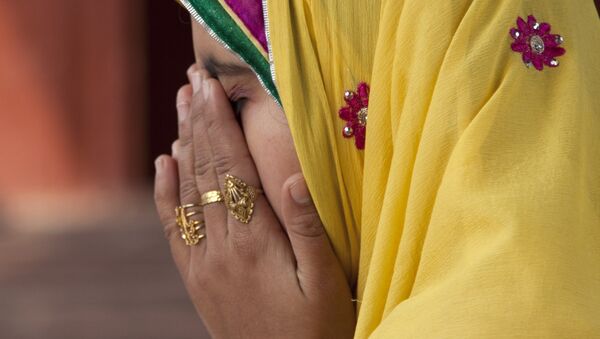The study, published by the Sikh Mediation and Rehabilitation Team charity, documented in shocking detail how young members of the Sikh community have been systematically groomed by Muslim men since the 1960s. Girls would be lured by "fashionably-dressed adult Pakistani men travelling in flamboyant vehicles to predominantly Sikh dominated areas and schools" — after initial contact, they'd be groomed by one man, who would then pass her on to other family members.
Labour MP Sarah Champion, who strongly endorsed the report, is calling for an independent investigation into the scandal.
"I was shocked when I first heard about the organised abuse of Sikh girls by Pakistani men. When I started speaking to Sikh women, I couldn't believe how widespread the grooming and abuse was — and this has been going on for decades. All forms of sexual exploitation must be prevented. We need to speak of the abuse of Sikh girls to take it out of the shadows and make sure the authorities take it seriously," she said.
Conspiracy of Silence
"This is a historical problem for us. The sexual abuse of young, vulnerable girls is evidently socially acceptable for certain members of the Muslim community — it's a minority, yes, but the characteristics of the perpetrators must be acknowledged and exposed. Sikhs have openly condemned this issue from day one, and alerted authorities back in the 1970s — and the 1980s and 1990s — but it was repeatedly brushed under the carpet," he said.
Lord Indarjit Singh, director of the Network of Sikh Organisations charity, is a prominent, respected and highly influential member of the British Sikh community — and he has witnessed official refusal to acknowledge the issue first-hand. Roughly a decade ago, he raised his concerns about Islamic grooming with the Inter Faith Network, a government-connected group dedicated to "promoting good relations between persons of different faiths". The Muslim representative on the body's board of governors said he was "well aware" of the problem, but "they just tended to ignore such people".
Indeed, such was official stonewalling, Deepa notes many Sikhs took it upon themselves to defend their families and communities from Islamic grooming gangs — they would be prosecuted and severely punished for their vigilantism. Peter McLoughlin, author of the 2014 work Easy Meat which delved into the issue of grooming gangs in forensic detail, believes these incidents as the earliest public manifestation of the phenomenon — and he can find no records indicating any member of a Muslim grooming gangs was the target of arrests and prosecutions at the time.
"In 1988 in Wolverhampton there were violent confrontations after Sikhs formed into gangs to protect young Sikh girls from being groomed by gangs of Muslim men. The main Sikh gang was called Shere Punjab. Some of the gang members received criminal convictions because of their attacks on Muslim gangs. It all started when the Sikh gang handed leaflets out saying "Muslim youths are coming round our schools… they are abducting our girls… and they are raping them and putting them into prostitution", a description entirely consistent with what's since finally been officially acknowledged about grooming gangs since. Shere Punjab claim to have given police the names and car registration details of those Muslims involved in grooming non-Muslim girls, and been told by officers they'd sort out the problem if the gang "stepped out the way" — but they did nothing to stop the sexual abuse gangs operating. Again, this is entirely consistent with the behaviour of authorities in other parts of the country since," Peter told Sputnik.
This may account for why the Sikh Awareness Society, set up in 1998 to provide support for Sikhs affected by grooming gangs, among other issues, is inundated with requests for help each and every day — founder Mohan Singh says the organization's 24-hour helpline "never stops ringing".
Hear No Evil
A palpable demonstration of this official conspiracy of silence in practice is provided by the example of Rotherham, which was home to the "biggest child protection scandal" in UK history.
There, organized child sexual abuse continued almost unchallenged by legal authorities from the late 1980s to the early 2010s, with up to 1,400 children affected. The abuse included gang rape, forcing children to watch rape, dousing victims with petrol and threatening to set them on fire, threatening to rape victims' mothers and younger sisters, and trafficking them to other towns. Several victims also became pregnant —one aged 12.
The next year, Rotherham council created a youth project, Risky Business, aimed at helping girls aged 11 — 25 at risk of sexual exploitation. Its chief, Jayne Senior, soon concluded a grooming network was operating in the town — and collected so much information police suggested she start forwarding it to an electronic dropbox on the South Yorkshire Police computer network. Senior, who earned an MBE in 2016 for her role in uncovering the scandal, later learned that police did not read anything she submitted to the dropbox, and its contents could not be accessed by other forces.
Moreover, a 2010 internal Rotherham Safeguarding Children Board memo stated "great care will be taken in drafting this report to ensure its findings embrace Rotherham's qualities of diversity. It is imperative suggestions of a wider cultural phenomenon are avoided."
"As every month passes, the argument in Easy Meat proves more and more prescient. My book came out nearly five years ago. It was an attempt to wake the public up, get them to demand civilized solutions to the problem. However, I fear by 2024 it'll still be years ahead of mainstream debate on grooming gangs. Any hope I had of the country changing course has faded now," Peter grimly concludes.
The views and opinions expressed by the speakers do not necessarily reflect those of Sputnik.





